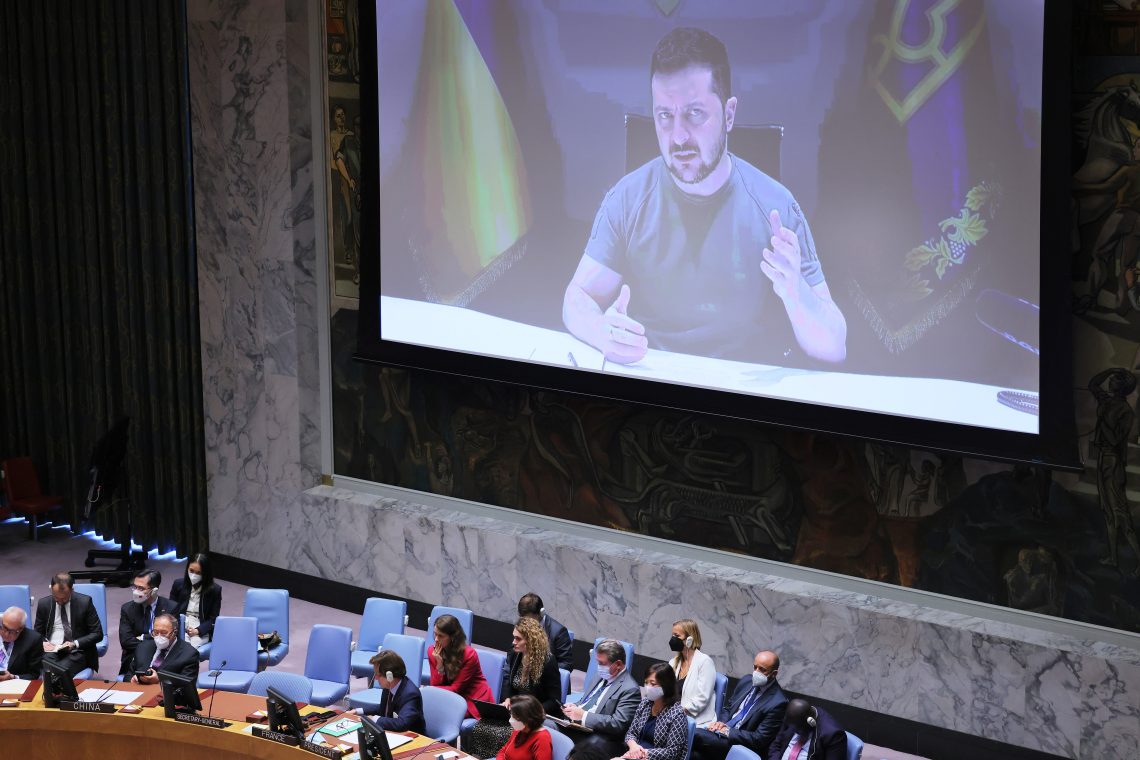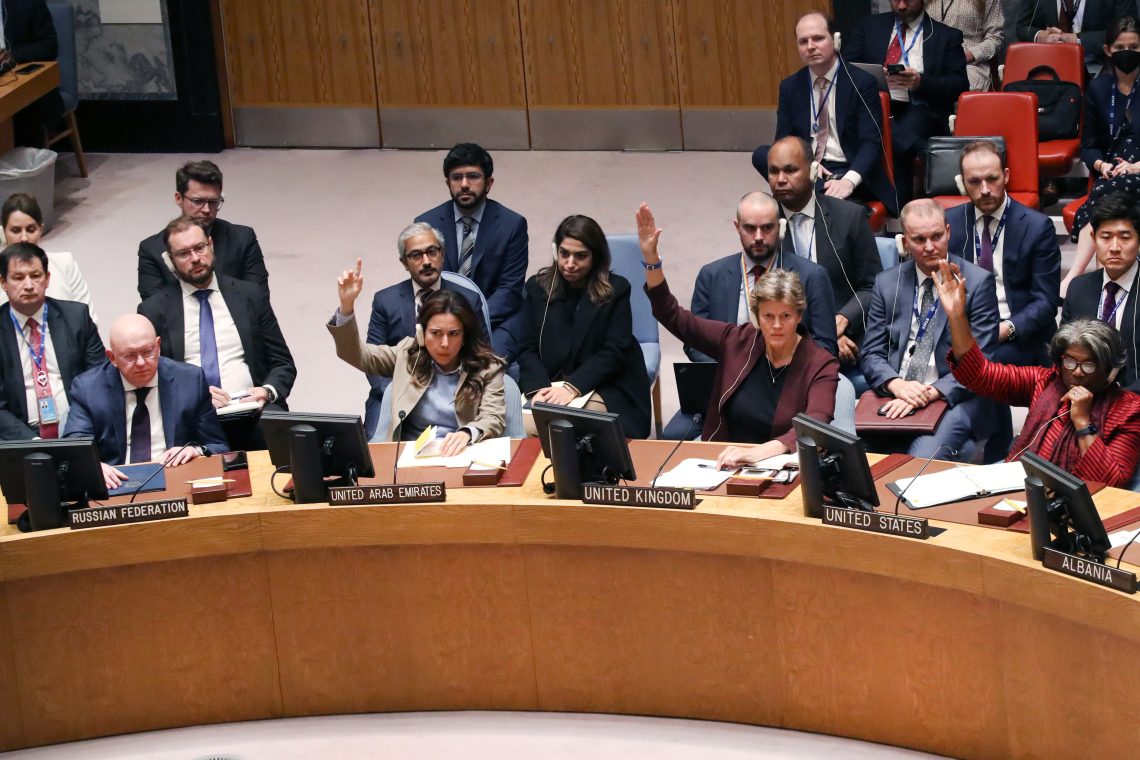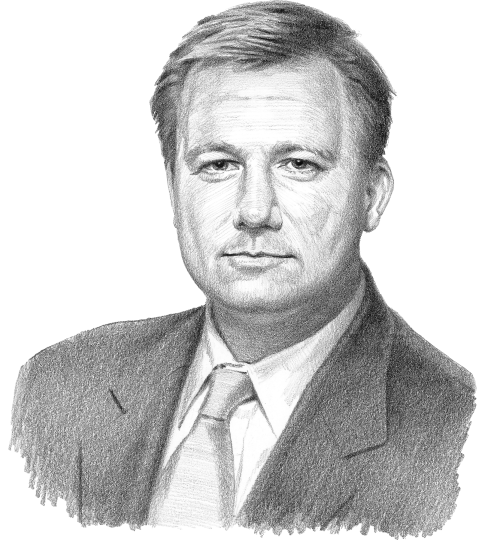A narrow path to reforming the UN Security Council
The weak response from the United Nations body for maintaining international security to the invasion of Ukraine has elicited calls for reform.

In a nutshell
- The Security Council is not effective in dealing with big international crises
- Calls for reforming the body have grown louder since the war in Ukraine
- Big powers block radical change but expanding the council is possible
Reforming the United Nations Security Council, an episodic effort that waxed and waned in focus during the post-Cold War era, has returned as a hot topic after Russia invaded Ukraine in February 2022.
As a permanent Security Council member, Russia predictably used its veto to block the council from acting to address the crisis. That spurred Ukrainian President Volodymyr Zelenskiy to challenge the body to act or “dissolve yourself altogether.” Dissolution is unlikely, but the paralysis has given new ammunition to those who demand change.
United States President Joe Biden breathed further life into the effort to enlarge the council when he endorsed the idea in his September 2022 remarks to the UN General Assembly. The U.S. president said:
Members of the UN Security Council, including the United States, should consistently uphold and defend the UN Charter and … refrain from the use of the veto, except in rare, extraordinary situations, to ensure that the council remains credible and effective. …[T]he United States supports increasing the number of both permanent and non-permanent representatives of the council. This includes permanent seats for those nations we’ve long supported and permanent seats for countries in Africa [and] Latin America and the Caribbean. The United States is committed to this vital work.
That was music to the ears of many in developing nations, particularly in Africa, Asia and Latin America, that have long demanded greater representation in the council. Unsurprisingly, several countries that aspire to permanent seats on a reformed panel – Brazil, Germany, India, Japan, Kenya, Mexico, Nigeria and South Africa – also expressed support.
While concerns about the council run high, the path to reforming it is narrow and tortuous. Challenges abound, making the outcome highly uncertain.
The mandate
The Security Council is the United Nations’ most powerful organ, charged by the UN Charter with primary responsibility for maintaining international peace and security. To fulfill this responsibility, the charter grants the council broad authority to intervene to resolve disputes, including initiating investigations and seeking solutions through negotiation, mediation or other peaceful measures.
All five permanent members have a veto, and any of them can use it to block the body’s decisions and resolutions, even if all remaining members support the measures.
The council is empowered to take additional measures to address crises threatening international peace and security. They include applying sanctions and approving the use of force necessary to restore peace. UN member states are obligated under its charter to “accept and carry out the decisions of the Security Council.”

Initially, the council comprised five permanent members of the UN: the Republic of China (Taiwan), France, the Union of Soviet Socialist Republics, the United Kingdom and the U.S., and six member states elected by the UN General Assembly to a term of two years with “due regard being specially paid, in the first instance to the contribution of Members of the United Nations to the maintenance of international peace and security and to the other purposes of the Organization, and also to equitable geographical distribution.”
A supermajority of the council adopts its decisions. All five permanent members have a veto, and any of them can use it to block the body’s decisions and resolutions, even if all remaining members support the measures.
Read more on UN challenges
The worrying faults of the UN migration compact
Because of the council’s power and prestige, many UN member states aspire to sit on it and work within their regional groups to amass support for their candidacies. To avoid contentious squabbles, regional groups often agree years in advance on which countries they will put forward for election to the council.
Facts & figures
Factbox: Current Security Council members
The council comprises 15 members – five permanent members and 10 members elected for two-year terms commencing on January 1. Each year, five new members are elected to join the body and five leave it.
The permanent members are China, France, the Russian Federation, the UK and the U.S.
The current nonpermanent members whose terms end in 2022 are: India, Ireland, Kenya, Mexico and Norway. The nonpermanent members whose terms end in 2023 are: Albania, Brazil, Gabon, Ghana and the United Arab Emirates.
Amending the charter
Altering the council’s size, terms for members, thresholds for approving resolutions or the powers of the permanent members require amending the charter. Amendments enter into force when they have a two-thirds vote of support in the UN General Assembly and two-thirds of the assembly’s member states – including all permanent members of the Security Council – have ratified them.
With such barriers in place, amendments are rare. The UN Charter has been amended only five times since its adoption in 1945, with the most recent changes entering into force in 1973. The amendments most relevant to the focus of this report were those made to Articles 23 and 27, in force since 1965. These amendments increased the Security Council’s size from 11 to 15 members by adding four additional elected members. Also, it increased the threshold for adopting decisions from affirmative votes of seven to nine members, including the concurring votes of the five permanent members. (Both a positive vote and an abstention by a permanent member is regarded as a concurring vote allowing a decision or resolution to be adopted.)
Nations in Africa and Asia, whose numbers swelled as colonies became independent nations, particularly pressed for additional elected seats.
In the early 1960s, pressure to expand the Security Council arose principally from complaints that the body no longer adequately represented the UN membership. The member states’ ranks more than doubled from the original 51 in 1945 to 113 in 1963 when the General Assembly approved resolution A/RES/1991 (XVIII) to amend the charter.
Nations in Africa and Asia, whose numbers swelled as colonies became independent nations, particularly pressed for additional elected seats. China, then represented by Taiwan, was the only permanent member to support the 1963 resolution. France and the Soviet Union opposed it; the UK and the U.S. abstained. But political dynamics and the rising influence of new members ultimately led the permanent members to ratify the proposed amendments.
Repetition of the past?
Further expansion of the Security Council has been discussed since the early post-Cold War era. Justifications echoed the arguments made in the 1960s: that UN membership has again increased substantially (to 193 member states), that the council does not reflect the current world order, and that the developing world and emerging powers deserve larger representation.
Facts & figures
Joining the Security Council in 2023
Each year, the General Assembly elects five non-permanent members out of a total of 10 for a term of two years. In accordance with the statutes, the 10 non-permanent seats are distributed on a regional basis: five for African and Asian states, one for Eastern European states, two for Latin American and Caribbean states, and two for Western European and other states.
The five members elected in June 2022 to serve for the 2023-2024 period are Mozambique, Japan, Ecuador, Malta and Switzerland.
More than 50 UN member states have not yet served on the council. All countries, regardless of their UN membership, may be invited to take part, without a vote, in the council’s discussions if they are parties to a dispute considered by the body. The council sets conditions for the participation of such countries.
Several proposals have been floated, most prominently by the so-called G4 (Brazil, Germany, India, and Japan support each other’s bids for permanent council seats), the Uniting for Consensus coalition (or UfC; led by Italy, the coalition aims to counter G4 bids) and the African Union. All three factions support a substantial expansion to 25 or 26 total Security Council seats and – UfC takes exception here – adding six new permanent members with veto power. None of these proposals has garnered enough support in the General Assembly to initiate the amendment process.
Since 2008, the UN has annually convened intergovernmental negotiations on “equitable representation on and increase in the membership of the Security Council …” As detailed in a recent report by the group cochairs, there is consensus that the council should be expanded and the relationship between the council and the General Assembly strengthened. However, substantial disagreements remain regarding the particulars.
Considering the complications of finalizing a council expansion proposal that garners support from two-thirds of the member states and all the current permanent council members, the most likely outcome is continuing paralysis.
Scenarios
While there is broad support for reform goals, there are deep – perhaps insurmountable – disagreements within geographical regions over which countries should make new permanent council members.
Argentina, Brazil and Mexico in Latin America all aspire to permanent seats. In Asia, India, Japan, Pakistan, Indonesia and others have similar aspirations. Likewise, in Africa, Egypt, Nigeria, Kenya, and South Africa seek that status. Resolving these competing interests will be challenging.
Defense of privileged position
Even if these disagreements are settled somehow, support from the current permanent members is far from certain. How would China or Russia react to the proposal that Japan, India, or Ukraine become new permanent members? In the past, the U.S. voiced concern that enlargement could further weaken the effectiveness of the Security Council. This problem will grow if new permanent members also are granted veto power. Proposals to eliminate or limit the veto through charter amendment will be received skeptically by the current permanent members.
In short, despite the weaknesses highlighted by the Security Council’s inaction on Ukraine and President Biden’s endorsement of reform, the complications that have stalled reform for decades are likely to delay it further.
Possible expansion
If the council enlargement is to take place, the most likely path to success is by expanding the number of nonpermanent seats, possibly allowing for consecutive terms.
While disappointing to those countries that aspire to permanent seats, this approach avoids the most insurmountable roadblocks: choosing new permanent members among too many aspirants; further seizing up the body’s occasionally sclerotic process with more veto-wielding members; and opposition by a current permanent member to elevating a regional rival.
Procedural changes could enhance such a limited reform, like the recent General Assembly resolution requiring a formal meeting after a permanent member casts a veto to debate the matter. Moreover, Security Council inaction is likely to result in increased use of Emergency Special Sessions under the Uniting for Peace mechanism, which has been triggered this year in response to Russia’s vetoes over Security Council action relating to its invasion of Ukrainian.
The radical reform advocated by countries like Brazil, Germany, India, Japan or South Africa – a council broadening and adding permanent seats with veto power – remains theoretically possible. However, a yet-unseen regional coordination would be needed for it to materialize, as well as a geopolitical change alleviating the security concerns of the current permanent members. Washington’s concern for the council’s effectiveness would also need to diminish. The U.S. and like-minded countries are adamant that the Security Council must remain a viable (if imperfect) instrument for addressing threats to international peace and security and are unlikely to support reforms that undermine that prospect.









